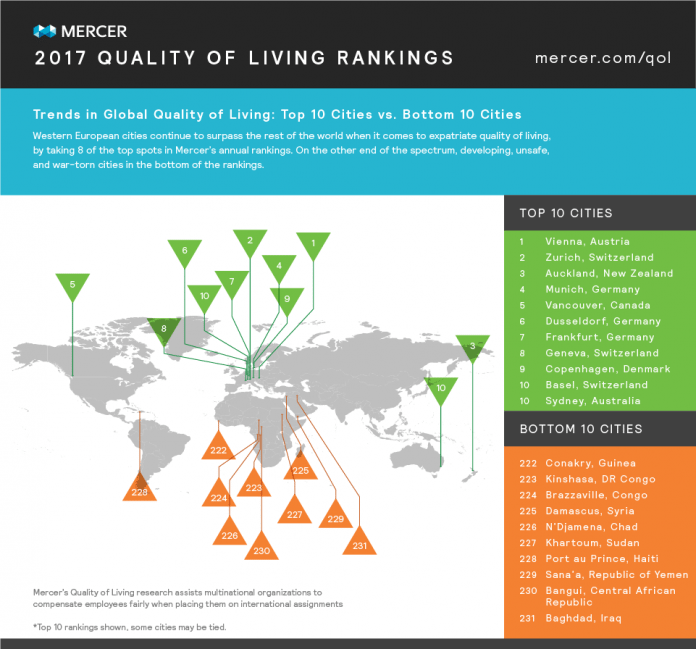
- Dubai ranks 74th globally in overall quality of living, making it the number one city in the Middle East and Africa region for the fifth year running
- Infrastructure is pivotal in determining quality of living for expats and was ranked separately in Mercer’s Quality of Living Survey 2017
- Dubai was ranked in 51st place for infrastructure, again making it the top city in the Middle East and Africa region
Dubai has again claimed the number one spot for quality of living across the Middle East and Africa region, according to Mercer’s 2017 Quality of Living Survey. The city came in 74th place in the global ranking, making it the region’s top city for the fifth year in a row.
Vienna occupies first place for overall quality of living for the 8th year running, with the rest of the top-ten list mostly filled by European cities: Zurich is in second place, with Munich (4), Dusseldorf (6), Frankfurt (7), Geneva (8), Copenhagen (9), and Basel, a newcomer to the list, in 10th place. The only non-European cities in the top ten are Auckland (3) and Vancouver (5). The highest ranking cities in Asia and Latin America are Singapore (25) and Montevideo (79).
Dubai (74) continues to rank highest for quality of living across Africa and the Middle East, rising one position in this year’s survey. It is followed closely by the neighbouring Emirate of Abu Dhabi, which has climbed three spots since last year’s survey to claim 79th place, which according to Rob Thissen – Mercer’s Middle East Talent Mobility Lead – “is due to improvements in infrastructure.” Saudi cities Riyadh and Jeddah find themselves further down the ranking at 166th and 169th respectively, whereas Sana’a (229) in Yemen, Bangui (230) in the Central African Republic, and Baghdad (231) in Iraq are the region’s and world’s three lowest-ranked cities for quality of living.
Ilya Bonic, president of Mercer’s Career Business, commented: “Economic instability, social unrest, and growing political upheaval all add to the complex challenges faced by multinational companies when analysing quality of living for their expatriate workforce. For multinationals and governments, it is vital to have quality of living information that is accurate, detailed, and reliable. It not only enables these employers to compensate employees appropriately, but also provides a planning benchmark and insights into the often-sensitive operational environment that surrounds their workforce.”
Mr Bonic added: “In uncertain times, organisations that plan to establish themselves and send staff to a new location should ensure they get a complete picture of the city, including its viability as a business location and its attractiveness to key talent.”
City infrastructure, highlighted separately in this year’s Quality of Living Survey, plays an important role when multinationals decide where to establish operations abroad. When sending expatriates to new locations, important considerations include easy access to transportation and reliable electricity. These are especially significant factors for determining whether or not to offer employees a ‘Quality of Living allowance’ based on differences between their home and host location. Dubai also ranked highest in the Middle East and Africa region in terms of infrastructure, claiming 51st place in the survey’s global ranking and reaffirming the city’s position as a leading regional business hub.
While Dubai ranked highest, only a few other cities in the region made the top 100. These were Abu Dhabi (67), Port Louis (94), Muscat (97) and Doha (96), the upcoming host of the 2022 FIFA World Cup. Cities in African and Middle Eastern countries dominate the bottom half of the list for infrastructure, with Brazzaville (228) in the Republic of the Congo, Sana’a (229), and Baghdad (230) ranking the lowest.
Mercer’s authoritative Quality of Living Survey is the most comprehensive in the world, taking the city’s political and social environment, medical care and health considerations, public services, recreation facilities and natural environment into account, amongst myriad other factors. The report is compiled by the company to assist multinational companies in compensating employees fairly when placing them on international assignments. It also provides valuable information and hardship premium recommendations for over 440 cities throughout the world, ranking 211 cities across five continents based on criteria such as safety, economic transparency and growth.
Mr. Thissen concludes: “The success of foreign assignments is influenced by issues such as ease of travel and communication, sanitation standards, personal safety, and access to public services. Multinational companies need accurate and timely information to help calculate fair and consistent expatriate compensation – a real challenge in locations with a compromised quality of living.”
“A city’s infrastructure, or rather the lack thereof, can considerably affect the quality of living that expatriates and their families experience on a daily basis. Access to a variety of transport options, being connected locally and internationally, and access to electricity and drinkable water are among the essential needs of expatriates arriving in a new location on assignment. A well-developed infrastructure can also be a key competitive advantage for cities and municipalities trying to attract multinational companies, talent, and foreign investments.”
Mercer produces individual cost of living and rental accommodation cost reports for each city surveyed. For more information on city rankings, visit www.mercer.com/col.



































